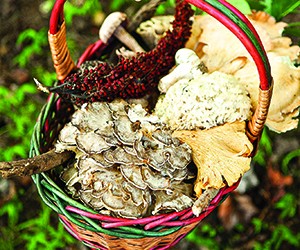The accolades keep rolling in for Asheville, N.C., with the latest being Lonely Planet’s No. 1 “Best in the U.S.” destination for 2017.
One reason could be that Asheville is a condensed community—a city that can feel like a small town.
“Asheville is vibrant and authentic and the downtown is loved by guests and locals alike,” explained Dianna Pierce, vice president of sales for the Asheville CVB.
Or it could be its food and drink culture. One common thread in the city’s awards, press and media attention is its outstanding culinary offerings, including restaurants, breweries, distilleries, butchers and chocolatiers, among others. And it’s not just what is being produced in Asheville, but love for community and land.
Asheville’s Estate
“Asheville is about local and fresh,” Pierce said. “Larger hotels to craft breweries use fresh, local products and ingredients. Hotels incorporate local offerings into their programs and restaurants.”
With 8,000 acres and grand historic spaces, the Biltmore Estate has its own vineyards and winery, agricultural farm and pastures. George Vanderbilt’s country retreat, the Biltmore House, was completed in 1895 and since then the estate—still the largest privately owned home in the U.S.—has grown to include a winery, the Inn on Biltmore Estate, Antler Hill Village and in 2015, Village Hotel on Biltmore Estate.
There is no shortage of culinary-focused teambuilding and group activities at the Biltmore Estate.
“Some of the possibilities include cook-offs at Antler Hill Barn, culinary demos with estate chefs, Vine to Wine tours for groups and seasonal holiday cocktail mixology demos,” explained Biltmore Public Relations Manager Marissa Jamison.
In line with what seems to be the drink of choice in Asheville—craft beer—Biltmore offers a beer pairing dinner in the loft space at Cedric’s Tavern where five courses are specially paired with local beers. The dinner also incorporates the property’s Field-to-Table program, which features local and seasonal ingredients, many grown on-site at the West Side garden. Providing a more in-depth venture into the craft beer world, the Biltmore-Highland Brewing Company Tour, Tasting and Dinner takes groups off-property to Highland Brewery for a guided tour and tasting and then back to Cedric’s Loft for a field-to-table dinner.
Groups can gain insight and learn about the estate’s agricultural history and farming with the West Side Agricultural Tour to see firsthand the fields used for canola oil production, grazing cattle and for growing a fruit and vegetable garden, which is used for the property’s Field-to-Table program. Wine tours, tastings, seminars and pairings of all kinds are also available through Biltmore’s winery.
Beer City
Asheville is known to have more breweries per capita than any U.S. city, and in addition to home-grown brewers, larger craft brewery outlets, such as California’s Sierra Nevada Brewing Company and Colorado’s New Belgium Brewing Company, have moved into town.
For a taste of the local brewing scene visitors can start with downtown Asheville’s oldest craft brewery, Highland Brewing Company. The brewery debuted a rooftop beer garden last May and the indoor event center opened in late 2015, providing space for up to 500 guests. Groups can use the ground floor, mezzanine and rooftop space together, or each floor as a separate area for smaller meetings and events.
PageBreak
Thanks to park land and land trusts, the rooftop beer garden has protected views of the Blue Ridge Mountains. Possibly inspired by the beauty of the surrounding land, the brewery has made a commitment to sustainability. Repurposed shipping containers are used for the bar and bathroom on the rooftop and solar power is used when possible. Other green features include reused concrete for the indoor flooring, a live roof to reduce energy use, high-efficiency and temperature-controlled windows, as well as infrastructure that collects rainwater.
“The rooftop reveals our solar array, the third-largest array among all craft brewers in the country,” explained Highland Brewing Company President Leah Ashburn. “On sunny days all power use is offset and additional power generated goes back on the grid to further reduce energy use.”
In addition to using the rooftop and event center as a venue, group tours and tastings are available to share the history of the company and explain the brewing process.
LaZoom Tours, which started 10 years ago with its cheeky City Comedy Tour, now offers a Band & Beer Bus Tour. This new tour takes up to 40 guests on a three-hour bus ride through town, starting at a craft beer store and stopping at three breweries. More than just a bus ride, or designated driver, local bands board the bus and play between stops. The tour emcee is also there to keep riders up-to-date on the local beer scene.
For day-to-day tours, participants order their own brews at each stop, but for bus buyouts and special group tours, LaZoom Tours can work with the breweries to arrange for special tastings or pours at each stop.
“We have had groups arrive at the brewery and tastings are already poured and waiting for the riders,” explained LaZoom Tours Sales and HR Manager Kelly Morgan.
Asheville-to-Table
Often called “foodtopia,” Asheville also has a strong culinary culture. Groups can go on walking tours of downtown, a Saturday brunch tour with Asheville Food Tours or head to the kitchen at Cottage Cooking Asheville for cooking classes, such as its “Gluten-free Tapas” option or carb-loading “Taste of Italy” tour.
For groups that want to take the farm-to-table approach a step further, No Taste Like Home, led by Alan Muskat, CEO (chief edutainment officer), offers foraging excursions, presentations, cooking classes, retreats and even banquets serving wild food found in the Asheville area. Taking advantage of the micro-climates and biodiverse region, No Taste Like Home leads tours of all kinds to collect wild foods, including mushrooms, fruits, greens, seeds and nuts. According to Muskat, there are over 300 edible species that grow in the region and they are not difficult to find.
“Most of it grows in the city,” Muskat said. “This Garden of Eden we live in here is very real, and the foundation is natural.”
Groups can “forage-to-table” with a wild food tour, followed by a cooking demonstration and dinner, with options of including music, dance and other entertainment at a local venue or farm. Or, for a more hands-on experience after foraging is the option of a cooking class and dinner.







